What percentage of the UK's adult population is dependent on the welfare state?
The welfare state is a big part of British family life, with 20.3 million families receiving some kind of benefit (64% of all families), about 8.7 million of them pensioners. For 9.6 million families, benefits make up more than half of their income (30% of all families), around 5.3 million of them pensioners. The number of families receiving benefits will be between 1 and 2 million fewer now because of changes to child tax credits that mean some working families who previously got a small amount now get nothing.
How big is the problem of families on benefits where generations have never worked?
The Joseph Rowntree Foundation published a study in December testing whether there were three generations of the same family that had never worked. Despite dogged searching, researchers were unable to find such families. If they exist, they account for a minuscule fraction of workless people. Under 1% of workless households might have two generations who have never worked – about 15,000 households in the UK. Families with three such generations will therefore be even fewer.
The graphic shows this broken down. Importantly, families experiencing long-term worklessness remained committed to the value of work and preferred to be in jobs rather than on benefits. There was no evidence of "a culture of worklessness" – values, attitudes and behaviours discouraging employment and encouraging welfare dependence – in the families being passed down the generations. The long-term worklessness of parents in these families was a result of complex problems (particularly related to ill-health) associated with living in long-term and deep poverty. In an already tight labour market, multiple problems combined to place people at the back of a long queue for jobs.
For 2011-12 it is estimated that 0.8%, or £1.2bn, of total benefit expenditure was overpaid as a result of fraud. This is far lower than the figures widely believed by the public, as revealed repeatedly in opinion polls. A TUC poll recently revealed that people believe 27% of the welfare budget is claimed fraudulently.
Hard to judge, and hard to generalise. There is a lot of movement in and out of work, so many Job Seekers Allowance claims are very short. More than 80% of claimants never go near the work programme because they aren't on the benefit for long enough. A lot are off it in under six months. For disability benefits, there are a lot more long-term claimants, of course. In 2012, 18% of working-age households were workless; in only 2% had no one ever worked. More than half of adults in households where no one has ever worked were under 25. So although the proportion of households where no one has ever worked has increased recently, it is likely to be a manifestation of high and rising young adult unemployment.
What proportion of the welfare bill goes on benefits to the unemployed? And how has this changed?
It's rising – but we've seen such movements before. At 13% between 2009-10 and 2011-12, the proportion of gross domestic product devoted to benefits is at an all-time high, but this is not the result of a long-term upward trend. Levels in the 1990s to 2008-09 fluctuated between 10% and 12%. The recession resulted in a substantial increase and the overall level has not fallen since. This mirrors the recession in the early 1990s, when the proportion of GDP spent on benefits increased by slightly more at around 3 percentage points.
Between 2001/02 and 2011/12, spending on "social protection" benefits – help given to those in need or at risk of hardship – increased from £156bn to £210bn. This £54bn growth was after inflation, a rate of 34%. At an increase of £24bn, pensioner incomes made up the largest share of the change, around nine-tenths of the growth, reflecting their size within the budget. Housing benefits spending grew at the fastest rate, 62%, because of increases in the number of claimants and the average cost of the benefit. Claimant numbers rose from 3.8 million in 2002 to 5 million in 2012, while average weekly benefit increased from £52 to £87.
If unemployment benefits are reduced, do more claimants find work?
They may stop claiming – but not necessarily go to work. The Joseph Rowntree Foundation has carried out a systematic review of international research on the impact of benefit sanctions. This finds, mainly from US research, that sanctions are successful in getting people off benefits, but this may be because they are dropping out of the system altogether, rather than going into decent work. European studies show that the use of sanctions is likely to lead to worse employment outcomes (lower pay and more likely to be back on benefits) than if sanctions are not used. This is because the threat or use of sanctions makes people take lower-quality jobs than if they had been allowed to wait for a better opportunity.
How many families last year received more in benefits than the proposed government cap of £26,000?
Around 58,000 households will have their benefits reduced by the policy in 2014-15. Greater numbers are affected by other welfare changes.
What proportion of people affected by the welfare reforms are in households where someone works?
It's not just the workless who will have to cut back. As the Institute for Fiscal Studies pointed out in January, because the proposed uprating changes apply to almost all benefits and tax credits both in-work and out-of-work households are affected.
Out of 2.8 million workless households of working age, 2.5 million will see their entitlements reduced by an average of about £215 a year in 2015-16.
Of 14.1 million working-age households with someone in work, 7 million will see their entitlements reduced, by an average of about £165 a year. Note that this figure includes 3 million families who lose only from the cuts to child benefit, at an average of about £75 a year. They also point out that other elements of the "consolidation package" have different effects, particularly for those on higher incomes (chart C)
The impacts of other changes will also be very significant for working as well as out-of-work households. Joseph Rowntree Foundation research on the council tax benefit showed that 2.4 million low-income families will pay on average £138 more in council tax in 2013-14. About 78% of the 2.4 million affected live in non-working households and pay no council tax. The average additional payment will be £132 for in-work recipients and £140 for those not working.
What is the correlation between a country's economic performance and the size of its welfare bill?
Richer countries spend much more (as a proportion of income) on welfare than poor ones – compare Sweden and Somalia. But of course that doesn't mean spending more on welfare makes a country richer: it mostly reflects the natural tendency of societies, as they become more prosperous, to increase social spending. Some economists argue that large welfare states, which need to be financed by equally large tax revenues, over time inhibit private-sector growth. However, the experience of the Nordic countries does show clearly that there is no necessary inconsistency between economic dynamism and a large and relatively generous welfare state.
Perhaps a better way to think about it is this: it seems likely that having no welfare state would not only make a country a very unpleasant place to live in but would inhibit economic growth, as a consequence of the inevitable social breakdown; equally a country where the state taxed away everyone's income and redistributed it would have no incentives for economic activity. So there's unlikely to be one "right answer". In practice, what matters to growth is not so much the size of the welfare bill but how it is spent – what sort of incentives does it give to people to work, become trained or educated, and so on.
What does this tell us about the UK's welfare state and its impact on growth? In fact, the overall size of the welfare bill as a proportion of GDP has been fairly stable over the past quarter century, as the chart shows.
To the extent there has been an upward trend, it's been driven by increasing numbers of pensioners, rather than more generous benefits. Meanwhile, spending on those below pension age – working age and children – has been flat overall, rising in recessions and falling outside them. And it's false to suggest that "benefit dependency" has been steadily increasing; the number on out-of-work benefits (unemployment benefit, incapacity benefits, and lone parents) peaked in the early 1990s and is now fully a million below that level.
This certainly doesn't tell us that spending is at the "right" level. Indeed, most economists would agree that over time reforms – especially increasing state pension ages to reflect increasing life expectancy – are required to ensure long-term sustainability. But it does tell us that anyone who says that spending too much on welfare or benefits is the cause of the country's economic problems, or that spending less on them is the cure, is not paying much attention to the facts.
How many large families are heavily dependent on benefits?
To quote the Economist: "Though most of them seem to end up in newspapers, in 2011 there were just 130 families in the country with 10 children claiming at least one out-of-work benefit. Only 8% of benefit claimants have three or more children. What evidence there is suggests that, on average, unemployed people have similar numbers of children to employed people ... it is not clear at all that benefits are a significant incentive to have children."
How generous are our benefits in comparison to other EU countries?
Figures from Eurostat suggest the UK spends about the same as the EU average on unemployment and disability-related benefits, although it is behind the larger economies. The UK spends 12% less a head than France and 81% less than Germany, but almost twice as much as the Czech Republic.
How many have come off disability benefits since the reforms?
Since 2008, 878,000 new employment and support allowance claims have been closed before the claimant was able to be assessed and 729,000 have been found "fit for work" by tests. Since May 2010, 527,000 employment and support allowance claims have been closed and 414,000 found "fit for work".
Do any families get more than £100,000 a year in benefits, as George Osborne has claimed?
A freedom of information request by Full Fact showed that in August 2010, there were fewer than five housing benefit claimants receiving the equivalent of £100,000 a year.
• Compiled with help from the Joseph Rowntree Foundation (www.jrf.org.uk); Full Fact (www.fullfact.org); and Jonathan Portes, director, National Institute of Economic and Social Research (www.niesr.ac.uk)
Source: The Guardian







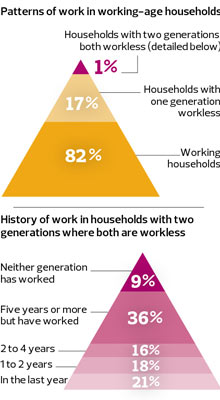
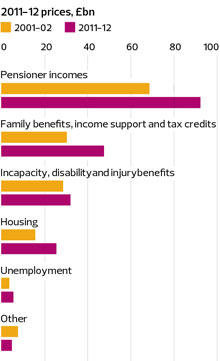
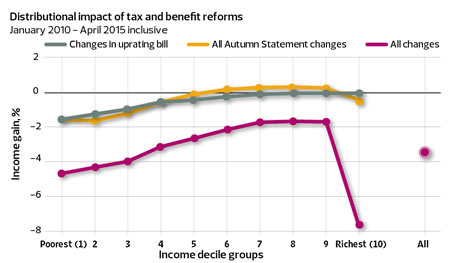
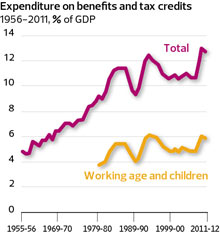
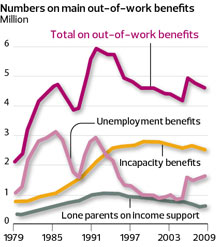
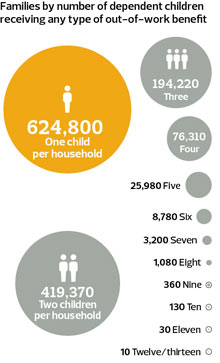

 Reply With Quote
Reply With Quote





Social Networking Bookmarks